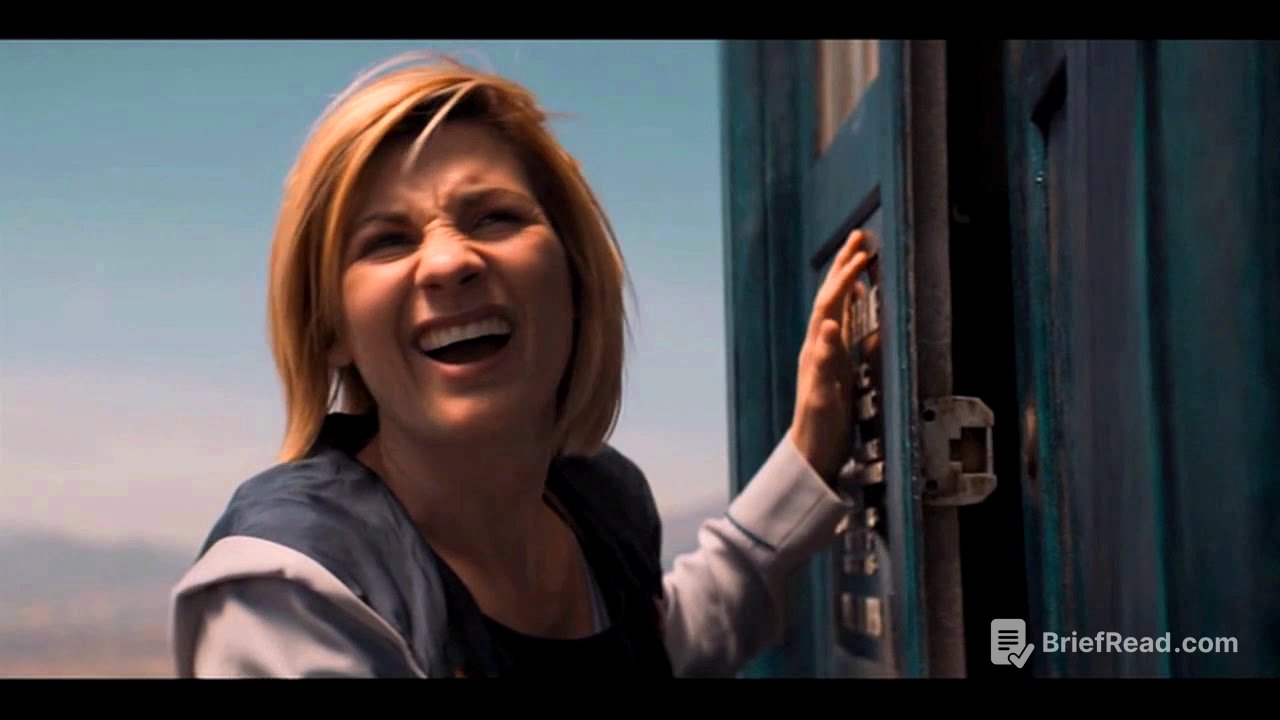TLDR;
The video provides a detailed review of Jodie Whittaker's first series as the Doctor in Doctor Who, offering both praise and criticism. The reviewer appreciates the show's facelift, shift in tone towards classic Who, and the companions, but notes issues with editing, plot, and some writing choices.
- The reviewer generally liked the show, appreciating its shift towards classic Who elements and more serious tone.
- Criticisms include rough editing, weak plots in certain episodes, and occasional writing choices that don't quite land.
- Specific episodes like "Rosa" and "Demons of the Punjab" are highlighted for their historical and political themes, while others like "Arachnids in the UK" and "The Battle of Ranskoor Av Kolos" receive more critical assessments.
Intro [0:00]
The video introduces a review of Judy Whitaker's first series as the Doctor, prompted by audience requests. The reviewer anticipates that their thoughts on the series may surprise some viewers, given their online reputation. Overall, the reviewer generally liked the series, noting its positive reception from general audiences and traditional critics.
The Thirteenth Doctor [0:29]
The reviewer expresses mixed feelings about the casting of Jodie Whittaker as the Thirteenth Doctor. While supportive of casting a woman in the role, they find Whittaker classically attractive yet bland, preferring Doctors with more interesting faces. They feel Whittaker's Doctor is essentially a remake of the Fifth Doctor with added irritation.
Facelift [0:59]
The reviewer is generally in favor of the show's facelift, describing it as the most significant since its return. The series has shifted to a kitchen sink drama without a space staff, marking a radical change in style and genre. The show looks and sounds different, with a new cast, TARDIS, and overall structure.
Looks Fantastic [1:55]
The show looks fantastic, with cinematography aiming for a Ken Loach style to match the Sheffield setting. The CGI is more realistic and integrated, and the sound is improved. The intro is beautiful, though generic, being a remake of Pertwee's first.
The Companions [3:27]
The reviewer generally likes the companions, viewing them as regular people going on adventures, a return to the status quo of classic Who. Having three companions creates an interesting dynamic but challenges the writers to give them all meaningful roles. The show feels more like classic Who with its regular companions, lower stakes, and overt politics.
Editing [4:46]
The editing is often rough, making it unclear what's happening at times, with a sense that minutes are missing. The series retains some dumb ideas from earlier New Who, such as the Doctor surviving a fall, but also has its own dumb ideas that stand out due to the series' serious tone.
The Woman Who Fell to Earth [6:00]
"The Woman Who Fell to Earth" is considered one of the better opening Doctor stories, with the Doctor lacking the usual crutches like the TARDIS and sonic screwdriver. The reviewer appreciates the Doctor's practical science and down-to-earth approach. However, they dislike the villain, Tim Shaw, finding him unthreatening and poorly written.
The Ghost Monument [8:51]
"The Ghost Monument" looks visually impressive, resembling a TV movie. The story starts well with a chase, but the aliens look too human, and the plot is ridiculous. The reviewer dislikes the toxic atmosphere that doesn't affect the characters and the deadly sniper robots that can't outthink bullets.
Rosa [12:33]
"Rosa" is the first celebrity historical of the series, but the reviewer focuses on its flaws, particularly the villain, Kraskow, a white supremacist from the future. The reviewer argues that the episode presupposes that anti-black racism will last until the 79th century, which is illogical given the cultural changes that should occur by then. They suggest alternative scenarios to fix this issue.
Arachnids in the UK [16:04]
"Arachnids in the UK" is described as a traditionally New Who episode with giant spiders. The CGI is spectacular, and the episode introduces Yaz's family, who are the reviewer's favorite New Who family. However, the plot is unbelievable, with too many direct connections to the spider invasion, and the explanation for the spiders' growth is silly. The reviewer also criticizes the Doctor's decision to let the spiders die slowly rather than shooting them.
The Tsuranga Conundrum [18:39]
"The Tsuranga Conundrum" is criticized for reusing ideas and weak writing. The monster is a poor version of Stitch, and the TARDIS being lost and miraculously saved is a rehash of a Hitchhiker's Guide to the Galaxy plot. The reviewer also dislikes the ship's propensity to explode and the convenient writing, such as the sonic screwdriver repairing itself. However, they appreciate the world-building, including the biological Android and male pregnancy.
Demons of the Punjab [21:56]
"Demons of the Punjab" is a historical episode set during the partition of India and Pakistan. The reviewer notes its similarities to "Rosa" in terms of historical upheaval, bigotry, and important themes. The episode is praised for challenging the mostly British audience with its unvarnished look at a period of history where the British did bad things.
Kerblam! [23:55]
"Kerblam!" is compared to Tom Baker stories like "The Robots of Death" and "The Sun Makers." While it gets some of the wit down, it lacks the cleverness and challenging ending of "The Sun Makers." The reviewer criticizes the episode's politics, making the villain a left-wing activist and the system a new liberal wet dream, and the ending, which barely addresses the gaping wound in the system.
The Witchfinders [26:48]
"The Witchfinders" is a celebrity historical that resembles an old-school New Who story. Alan Cumming delivers a tour de force performance as King James VI, though the reviewer notes that his portrayal is more like Charles I than James VI. The mud zombies look great, and the story fits with the series' tone of dour and serious with well-realized ridiculous elements.
It Takes You Away [30:11]
"It Takes You Away" is described as a controversial episode with three stories that meander into each other. The intro is solid, the mid-part is okay, and the finale is bizarre. The reviewer compares it to "Warriors' Gate" and criticizes the Solitract as silly. However, they defend the crappy cavern moths and Zathras, viewing them as part of the Solitract's great threats.
The Battle of Ranskoor Av Kolos [34:59]
"The Battle of Ranskoor Av Kolos" has parallels with classic Who, such as "Legolas." The return of Tim Shaw is seen as a wise decision, though dropping him entirely would have been better. The reviewer criticizes the sanctimonious Doctor stuff and the generic, underwhelming story. The episode is described as a half-hearted Russell T Davies finale cover version.
Whole Series Thoughts [37:33]
The reviewer concludes that series 11 is one of the better New Who series, with classic Who elements stuck into a bland persona. They acknowledge that their taste in Who is fundamentally different from most others, as they love the lack of glibness, serious tone, washed-out colors, science and history info dumps, and even the [ __ ] politics. While not in love with Thirteen, they place her on the same level as Five, Eight, Nine, and Ten.









